Thailand expels six more Cambodian political dissidents, even if they are refugees
Thailand repatriated the activists a day after detaining them. Once back in Cambodia, they were imprisoned in three different facilities. Human Rights Watch slammed the operation, lamenting that authoritarian governments in Southeast Asia routinely expel political prisoners to their country of origin. Next year, Thailand will have a seat on the UN Human Rights Council.
Bangkok (AsiaNews/Agencies) – Thai authorities repatriated six Cambodian activists and a child, the grandson of one of them even though five had refugee status and one was set to receive it.
“Thai officials have used immigration charges as a convenient excuse to deport these Cambodian refugees without court review and in blatant disregard for fundamental refugee protection principles,” said Elaine Pearson, Asia director of Human Rights Watch (HRW).
Pen Chan Sangkream, Hong An, Mean Chanthon, Yin Chanthou, Soeung Khunthea and Vorn Chanratchana were arrested on 24 November in Pathum Thani, north of the Thai capital, Bangkok, on suspicion of being in Thailand illegally.
The next day they were deported to Cambodia, where they were taken to three different prisons, while the five-year-old boy was released to family members.
They were arrested based on warrants issued by the Phnom Penh Municipal Court for “plotting to topple the government” under Article 453 of the Criminal Code, an offence punishable with up to 10 years in prison.
All six are supporters of the Cambodian National Rescue Party, which opposed Cambodia's authoritarian regime. Since its dissolution in 2017, the Cambodian government has prosecuted its former members on politically motivated grounds, HRW points out.
According to Radio Free Asia, Pen Chansangkream and Hong An were jailed in 2021 for participating in protests urging the Cambodian government to address issues of social injustice.
The four women and two men sought refuge in Thailand in 2022, where five had been placed under the protection of the UN Refugee Agency (UNHCR). Only one was still waiting to be granted refugee status.
Thailand has long been accused of helping governments in Southeast Asia in cracking down on political dissent; in exchange for repatriating those who flee Laos, Vietnam, and Cambodia, it gets Thai dissidents and activists in return.
This practice, well documented by HRW, violates customary international law and the United Nations Convention on Torture (to which Thailand is a party), as well as Thai domestic law. Although Thailand never signed the Geneva Convention on refugees, it allows the UNHCR to operate on its territory.
Thailand’s Act on Prevention and Suppression of Torture and Enforced Disappearances, which came into effect in February 2023, states that “no government organisations or public officials shall expel, deport, or extradite a person to another state where there are substantial grounds for believing that the person would be in danger of torture, cruel, inhuman, or degrading treatment, or enforced disappearance”.
Last February, Thai police arrested three Cambodian political dissidents in Bangkok ahead of the visit of Cambodian Prime Minister Hun Manet, who came to power last year in an undemocratic election, succeeding his father, Hun Sen.
During the visit, Mr Hun Manet thanked his Thai counterpart, then Srettha Thavisin, for preventing "harmful activities" against neighbouring countries.
That same month, Thai authorities detained three former members of the Candlelight Party (which now represents Cambodia’s main opposition force) who fled to Thailand for fear of political persecution.
This year, Thailand was given a seat on the UN Human Rights Council, for a three-year term starting 1 January 2025.
29/10/2022 10:47
28/04/2023 14:01
26/05/2023 16:42







.png)










